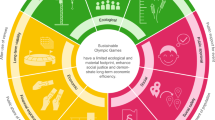Abstract
Moving from the theoretical paradigm of sustainability applied to events, this chapter proposes the case of Milan–Cortina 2026 Winter Olympic Games as an example of an innovative sporting event capable of setting sustainability as the most important lever of the project. During the work, the choices in the field of sustainability made by the organising committee will be illustrated, a comparison between the future 2026 Winter Games and those of the past will be presented, and finally the case will be analysed in light of previous literature. The results show that sustainability has gained increasing importance over time, appearing in all the chapters of the Milan–Cortina 2026 Bid Document. Compared to the previous literature, this chapter fits into the trend of case studies of application of the Olympic Agenda 2020 and confirms how this new vision has changed the concept of the Olympic Games, also in terms of sustainability.
Access this chapter
Tax calculation will be finalised at checkout
Purchases are for personal use only
Similar content being viewed by others
References
Clarkson, M. B. E. (1995). A stakeholder framework for analysing and evaluating corporate social performance. Academy of Management Review, 20, 92–117.
Efthymiou, L., Dekoulou, E., Orphanidou, Y., Sdoukopoulos, E., Perra, V. M., Boile, M., & Bras, I. (2022). Crisis, adaptation and sustainability: Digital system interoperability in the Cruise Industry. In D. Vrontis, A. Thrassou, Y. Weber, S. M. R. Shams, E. Tsoukatos, & L. Efthymiou (Eds.), Business under crisis, Vol. III: Avenues for innovation, entrepreneurship and sustainability. Palgrave Studies in Cross-disciplinary Business Research, In Association with EuroMed Academy of Business. Palgrave Macmillan. https://doi.org/10.1007/978-3-030-76583-5_1
Freeman, R. E. (1984). Strategic management: A stakeholder approach. Pitman.
Freeman, R. E. (1994). The politics of stakeholder theory: Some future directions. Business Ethics Quarterly, 4, 409–421.
Gulak-Lipka P., & Jagielski M. (2020). Incorporating sustainability into mega-event management as means of providing economic, social and environmental legacy: A comparative analysis. Journal of Physical Education and Sport, 20(Supplement issue 5), Art 388, 2859–2866.
IOC. (2014). Olympic Agenda 2020. Context and background. Montecarlo.
IOC. (2015). Olympic Agenda 2020. 20+20 recommendations. Lausanne.
IOC. (2020). Olympic Agenda 2020 drives progress and change. Retrieved December 21, 2021, from https://www.olympic.org/news/olympic-agenda-2020-drives-progress-and-change
IOC. (2021). IOC sustainability report 2021. Lausanne.
IOC. (2022). IOC annual report 2021. Lausanne.
Janowitz, M. (1969, Winter 1968–1969). Harold D. Lasswell’s contribution to content analysis. The Public Opinion Quarterly, 32(4), 646–653.
MacAloon, J. J. (2016). Agenda 2020 and the Olympic movement, sport in society cultures, commerce, media, politics, Vol. 19, 2016—Issue 6: From Olympic administration to Olympic governance: Challenges for our century (Vol. 19, pp. 767–785).
Mataruna Dos Santos, L. J., Zardini Filho, C. E., & Cazorla, A. (2019). Youth Olympic Games: Using marketing tools to analyse the reality of GCC countries beyond Agenda 2020. Journal of Human Sport and Exercise, 14(3proc), S391–S411.
Mi-Co. (2019). Milano Cortina 2026, Candidate City Olympic Winter Games, Milan.
Newman, H. K. (1999, April). Neighborhood impacts of Atlanta’s Olympic Games. Community Development Journal, 34(2), 151–159. https://doi.org/10.1093/cdj/34.2.151
Nicoliello, M. (2021, June). The New Agenda 2020+5 and the future challenges for the Olympic movement. Athens Journal of Sports, 8(2), 121–140.
Schnitzer, M., & Haizinger, L. (2019). Does the Olympic Agenda 2020 have the power to create a new Olympic heritage? An analysis for the 2026 winter Olympic Games Bid. Sustainability, 11(2), 442. https://doi.org/10.3390/su11020442
Smith, A. (2009). Theorising the relationship between major sport events and social sustainability. Journal of Sport & Tourism, 14(2–3), 109–120. https://doi.org/10.1080/14775080902965033
Thorpe, H., & Wheaton, B. (2019). The Olympic Games, Agenda 2020 and action sports: The promise, politics and performance of organisational change. International Journal of Sport Policy and Politics, 11(3), 465–483.
Thrassou, A., Vrontis, D., Efthymiou, L., & Uzunboylu, N. (2022a). An overview of business advancement through technology: Markets and marketing in transition. In A. Thrassou, D. Vrontis, L. Efthymiou, Y. Weber, S. M. R. Shams, & E. Tsoukatos (Eds.), Business advancement through technology, Vol. I. Palgrave Studies in Cross-disciplinary Business Research, In Association with EuroMed Academy of Business. Palgrave Macmillan. https://doi.org/10.1007/978-3-031-07769-2_1
Thrassou, A., Vrontis, D., Efthymiou, L., & Uzunboylu, N. (2022b). An overview of business advancement through technology: The changing landscape of work and employment. In A. Thrassou, D. Vrontis, L. Efthymiou, Y. Weber, S. M. R. Shams, & E. Tsoukatos (Eds.), Business advancement through technology, Vol. II. Palgrave Studies in Cross-disciplinary Business Research, In Association with EuroMed Academy of Business. Palgrave Macmillan. https://doi.org/10.1007/978-3-031-07765-4_1
Waitt, G. (2003, January). Social impacts of the Sydney Olympics. Annals of Tourism Research, 30(1), 194–215.
Yin, R. K. (1984). Case study research: Design and methods. Sage Publications.
Author information
Authors and Affiliations
Corresponding author
Editor information
Editors and Affiliations
Rights and permissions
Copyright information
© 2024 The Author(s), under exclusive license to Springer Nature Switzerland AG
About this chapter
Cite this chapter
Nicoliello, M. (2024). A New Era for the Olympic Games Following a Sustainability Path: The Case of Milan-Cortina 2026. In: Vrontis, D., Thrassou, A., Efthymiou, L., Weber, Y., Shams, S.M.R., Tsoukatos, E. (eds) Business for Sustainability, Volume II. Palgrave Studies in Cross-disciplinary Business Research, In Association with EuroMed Academy of Business. Palgrave Macmillan, Cham. https://doi.org/10.1007/978-3-031-37365-7_8
Download citation
DOI: https://doi.org/10.1007/978-3-031-37365-7_8
Published:
Publisher Name: Palgrave Macmillan, Cham
Print ISBN: 978-3-031-37364-0
Online ISBN: 978-3-031-37365-7
eBook Packages: Business and ManagementBusiness and Management (R0)




